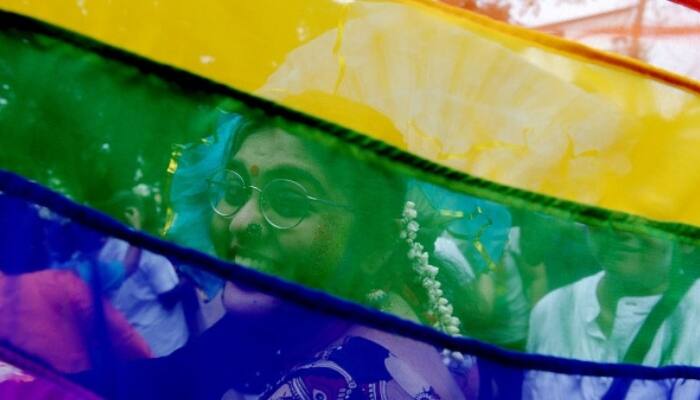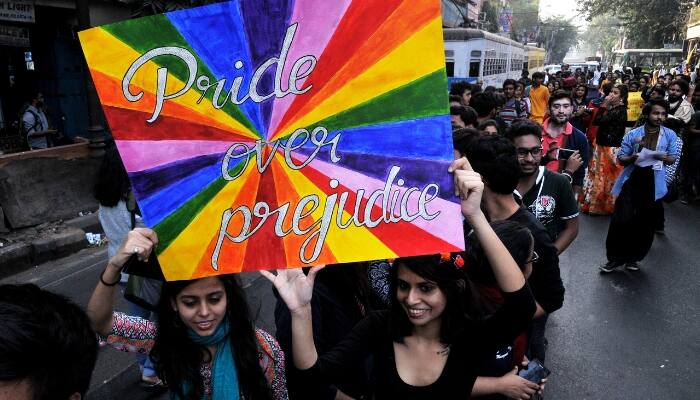In a landmark judgement, the Supreme Court on Thursday struck down Section 377 of the Indian Penal Code (IPC) and decriminalised homosexuality
In a landmark judgement, the Supreme Court on Thursday struck down Section 377 of the Indian Penal Code (IPC) and decriminalised homosexuality.
From 1861 to 2018, here's a brief history of Section 377 in India:
1861: Section 377 introduced in India by the British.
It was modelled on the Buggery Act of 1533. ‘Buggery’ was defined as an unnatural sexual act against the will of God and man, criminalising anal penetration, bestiality and homosexuality.
1994: AIDS Bhedbhav Virodhi Andolan files the first petition in Delhi HC against Section 377.
2001: Naz Foundation files petition in Delhi HC against Section 377.
The lawsuit filed was to allow homosexual relations among consenting adults.
2003: Delhi HC rejects Naz Foundation's plea.

2004: SC directs Delhi High Court to hear the case.
July 2009: In a landmark verdict, Delhi HC decriminalises homosexuality.
A bench of then Chief Justice AP Shah and Justice S Murlidhar ruled, “We declare section 377 of Indian Penal Code in so far as it criminalises consensual sexual acts of adults in private are violative of Articles 21,14, and 15 of the Constitution”.

2013: SC overturns Delhi HC’s order.
SC finds it “legally unsustainable”, “minuscule fraction of the country’s population constitutes LGBT”.
2014: Naz Foundation filed a review petition, claiming “rights to sexuality, sexual autonomy, choice of sexual partner, life, privacy, dignity and equality, along with the other fundamental rights guaranteed under Part-III of Constitution, are violated by Section 377”.
SC reconsidered petitions filed a by a group of well-known LGBT rights activists, S Johar, journalist Sunil Mehra, chef Ritu Dalmia, hotelier Aman Nath and business executive Ayesha Kapur.
Also read: Section 377: LGBT liberated in new India; Supreme Court decriminalises British idea of ‘unnatural sex’
2015: Shashi Tharoor's introduced Private Member Bill in Lok Sabha to decriminalise homosexuality.
BJP dominated Lok Sabha voted against Bill.
2016: 5 LGBT activists move SC over Section 377
The petition, filed by well-known LGBTQ activists, claimed their “rights to sexuality, sexual autonomy, choice of sexual partner, life, privacy, dignity, and equality, along with the other fundamental rights guaranteed under Part-III of Constitution, are violated by Section 377.”

July 10, 2018: SC begins hearing on Section 377
A five-judge Constitutional bench, led by Chief Justice of India Dipak Misra and comprising Justices R F Nariman, A M Khanwilkar, D Y Chandrachud and Indu Malhotra, begins hearing petitions challenging Section 377.
September 6, 2018: In a historic judgement, the Supreme Court ends Section 377, says that consensual sex between adults in private space, which is not harmful to women or children, cannot be denied as it is a matter of individual choice.
Last Updated Sep 9, 2018, 9:46 AM IST









![Salman Khan sets stage on fire for Anant Ambani, Radhika Merchant pre-wedding festivities [WATCH] ATG](https://static-gi.asianetnews.com/images/01hr1hh8y86gvb4kbqgnyhc0w0/whatsapp-image-2024-03-03-at-12-24-37-pm_100x60xt.jpg)
![Pregnant Deepika Padukone dances with Ranveer Singh at Anant Ambani, Radhika Merchant pre-wedding bash [WATCH] ATG](https://static-gi.asianetnews.com/images/01hr1ffyd3nzqzgm6ba0k87vr8/whatsapp-image-2024-03-03-at-11-45-35-am_100x60xt.jpg)


